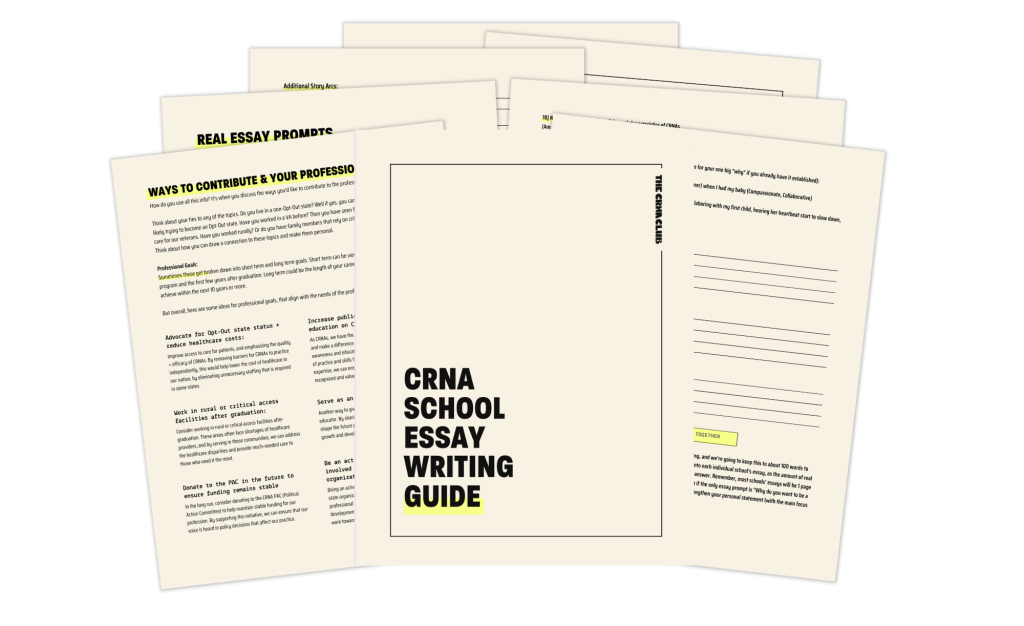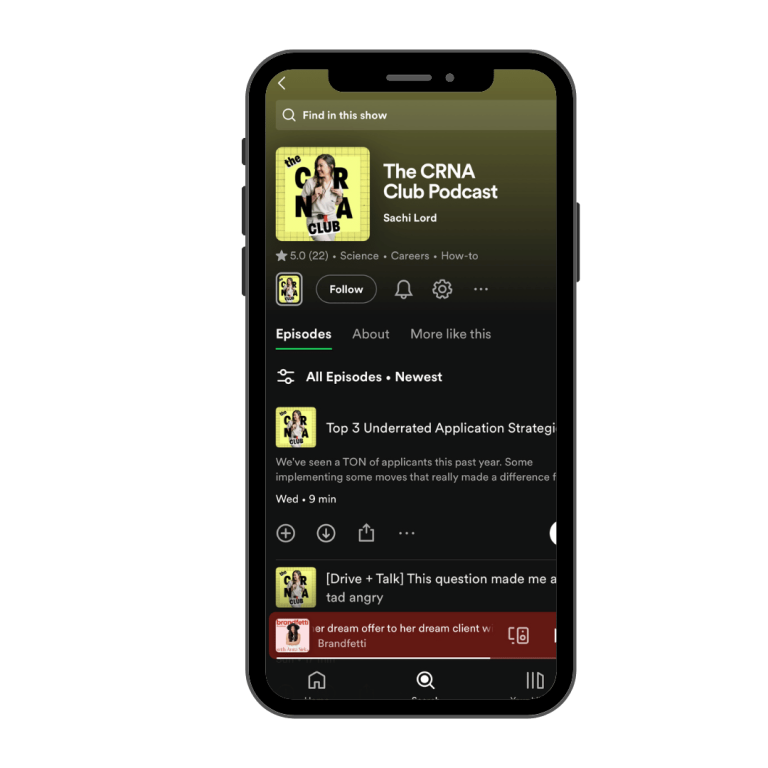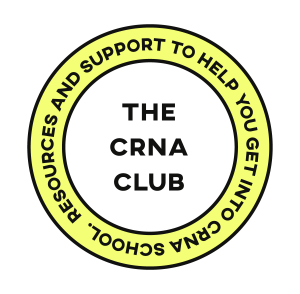ESSAY WRITING TIPS W/ DR. CADY
Related Resources + Files

*Please do not copy and paste exact phrases, hundreds (if not thousands) of applicants have access to these – personalize it.
In the above Workbook we cover hot topics to learn about, content generating prompts, common questions, defining your professional goals, and timeline for writing your essay.
Dr. Cady has helped many of our students write effective and quality essays over the past few years. While not a CRNA, she has assisted many applicants get accepted to top programs across the country. She is an academic, developmental editor who specializes in admissions essays – she’s got excellent advice!
Essay Writing Notes:
When to start?
While it may seem like a long time, give yourself at least 8 weeks to work on your essay. We have reviewed a LOT of essays and it takes multiple iterations to really get it right. You want to aim to have a few people read it, and it really does need to be personalized to each program. With the application pool becoming more competitive than ever, the essay is your opportunity to shine and entice the application committee to invite you for an interview.
Furthermore, be SURE you are answering the prompt. If the program is asking, “Why do you want to be a CRNA?” Don’t write an entire essay about your ICU experience, the classes you’ve retaken, etc. Answer the question – WHY do you want to be a CRNA? Really take a look at the prompt and make sure you are answering what it’s asking.
Lastly, the shorter the word requirement, the harder it is to write. It’s really difficult to be concise and get across what you want to convey in a limited word count. Yes, you may think everything you have to say is important, but think about these faculty reading hundreds of essays – you need to get straight to the meat and potatoes, and fast.
How do I find about issues facing the profession to write about in my essay?
Before you are able to articulate how you plan to contribute to the future of the CRNA profession, it might be helpful to identify some current issues facing the CRNA world. A great place to start would be the AANA website, there are lots of resources for you there, including past journal articles written by CRNAs.
- CRNA Fast Facts
- View Past Issues of the AANA Journal
- AANA Opt-Out State Sheet
- AANA Website – Check for National AANA Meeting dates + locations
- “Become a CRNA” AANA Sheet
Another great place to learn about current topics + trends would be AANA meetings, both state meetings and national meetings. If you can’t attend a meeting before your essay is due, find an upcoming meeting (search multiple state AANA meetings) and see if you can do some digging and find a conference agenda. That will tell you a LOT about the current topics CRNAs feel are worth discussing.
Things you should definitely look into:
What's the deal with Opt Out States?:
Opting out refers to a specific rule that affects hospitals and healthcare facilities when it comes to receiving money from the government for anesthesia services provided by a Certified Registered Nurse Anesthetist (CRNA). This money usually comes from programs like Medicare and Medicaid.
In the past, the government required CRNAs to be supervised by a doctor, any kind of doctor, in order for the hospital or facility to get reimbursed by the government. However, a rule implemented on November 13, 2001, changed things a bit. This new rule gave states the choice to “opt-out” or be “exempted” from the supervision requirement.
So, in states that have chosen to opt-out, hospitals and facilities that provide healthcare and anesthesia services through a CRNA can still receive money from the government without having to follow the supervision guidelines. This is especially helpful for many facilities in rural areas that need the funds to provide these important services without unnecessary oversight. By opting out of Medicare participation, CRNAs can fully utilize their education, training, and licensure. It recognizes their expertise in delivering safe and high-quality anesthesia care.
The CMS opt-out ruling of 2001 opened doors for CRNAs to provide care independently, and it’s a significant step forward for the profession. It showcases the important role they play in the healthcare system and expands their practice opportunities.
Crnas provide access in rural areas:
Rural hospitals across the country are facing closure at an alarming rate, with 145 shutting down since 2010, and 450 currently at risk. In these rural and critical access hospitals, CRNAs play a crucial role as they make up over 80% of anesthesia providers. Additionally, half of the rural hospitals in the US rely solely on CRNAs for obstetric care. Removing supervision requirements for CRNAs is a game-changer, as it will not only empower these healthcare professionals but also enhance access to care in rural communities. By leveraging the expertise of CRNAs, healthcare services can be sustained and improved, ensuring that vital medical assistance reaches those in need.
Crnas provide critical care for our veterans:
Did you know that around 23% of veteran households experience delays in securing health appointments and procedures? (AANA Source here – read me) Concerning, right? Back in 2016, the VA granted full practice authority to three out of four APRN specialties, unfortunately leaving out CRNAs. Throughout the pandemic, CRNAs were given full practice authority within the Veteran Health Administration (VHA), which was
a big step forward. One amazing advocate for autonomous practice in the VA is Jan Setnor, MSN, CRNA, who as of 2024 is the President of the AANA but is also a retired Colonel in the US Air Force. She has been actively championing for full practice authority in the military and supporting the expansion of autonomy within the VA. The Podcast Beyond the Mask Episode 244 is a great listen regarding this topic, with Jan Setnor, MSN, CRNA – AANA President.
WHAT IF THERE IS NO PROMPT?
Many schools don’t have prompts and just ask for a personal statement. In this case, it’s important to include a few key things:
1. Why CRNA?
- What qualities and characteristics did you observe in the CRNAs you shadowed, and tell us do you have these characteristics?
- What is it about you that will make a successful CRNA?
2. What have you done to prepare for graduate school?
- Talk about your high acuity clinical experience preparing you for the role of CRNA + graduate studies
- Retaken classes? GRE? Multiple certifications?
- Developed leadership skills?
- Research?
- Attended AANA meetings?
3. Why this program?
- Why is this a good fit for YOU, and why are you a good fit for THEM?
- Do you resonate with any of the faculty? Values?
- Have you interacted with any alumni or SRNAs? Don’t be afraid to name drop.
- Do any of the faculty hold leadership positions, have done any research that you are interested in, etc.
- Many people will include things like “sim lab, diverse clinical experience, etc”. Try to branch beyond the things you find on the website.
4. What are going to contribute to the future of the CRNA profession?
- Are you going to teach? Be faculty?
- Conduct research?
- Work rurally? If so, this is a big deal. CRNAs are needed rurally.
- Advocate for Opt-Out Status?
- Get involved in politics in your city/town and advance the scope of practice of CRNAs in your area?
- Focus on a specialty population like neonates?
5. Anything you want to address, "grab the bull by the horns"
- Previous degree that brought your GPA down
- Dismissal from previous program
- If you applied before, what have you done differently since then?
The essay is meant to give insight into your personality, characteristics and traits. The resume is more factual, list-like. The essay is your chance to expand on things you find most important.
Remember, you do not know what order the admissions committee is reading your assets. If they are not impressed by your essay, they may not read your resume and vice versa. Point being, don’t neglect the essay, most people take at least 8-12 weeks on just ONE essay. Get multiple people to read it.



